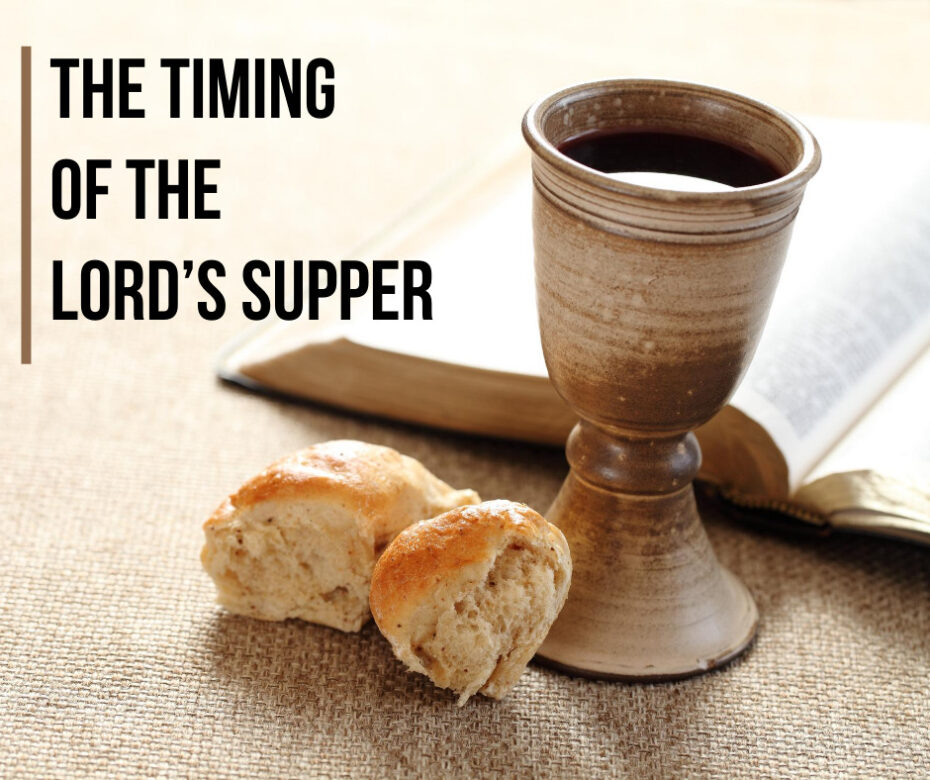You can discuss the timing of the Lord’s Supper in three different senses: frequency, intent, and Dispensation.
First, you can discuss the timing of the Supper in terms of frequency.
It would be nice if the Bible had direct teaching about how frequently you should celebrate it. But despite several passages devoted to discussing the topic, there is no clear Biblical command about how often you should celebrate the Supper.
For example, the first celebration of the Supper occurred during the yearly Passover meal. Does that mean the Lord’s Supper should be conducted yearly? No command says so.
We also know the early believers met and ate together on a daily basis, though we are not explicitly told that they celebrated the Lord’s Supper at those times:
So continuing daily with one accord in the temple, and breaking bread from house to house, they ate their food with gladness and simplicity of heart (Acts 2:46).
Then, in Acts 20:7, we read that the church in Troas met on the first day of the week to “break bread,” a Hebrew idiom for eating a meal (cf. Jer 16:7; Isa 58:7; Lam 4:4; Ezek 18:7; Matt 15:36):
Now on the first day of the week, when the disciples came together to break bread, Paul, ready to depart the next day, spoke to them and continued his message until midnight (Acts 20:7; cf. v 11).
Some people see a reference to the Lord’s Supper in that verse, but it does not explicitly say that (breaking bread does not equal celebrating the Supper). It also does not say that was the only day of the week when the Troasians met, or that it was their regular day, or that it was a practice that was normative for all churches (though theologians are tempted to read those details into the text).
Finally, Paul’s instructions about how to celebrate the Supper covers whenever it occurs (“as often as”), but not when it should occur:
“For as often as you eat this bread and drink this cup, you proclaim the Lord’s death till He comes” (1 Cor 11:26).
So when it comes to discussing the timing of the Supper in terms of frequency, the evidence is sparse and not as clear as I would like it to be. But that may be good news. It could mean the Lord has left us freedom as to how often we can celebrate it (for a different view see here and here).
Second, you can discuss the timing of the Supper in terms of intent. The difference between eating a typical meal and eating the Supper is not so much a question of what day it is, but what your intention is.
One of Paul’s complaints about the Corinthians was that when they came to meet together, they were being gluttonous and ignored the needs of their fellow believers—i.e., the wealthy Christians who had a lot of food would not share it with the poor believers who lacked:
For in eating, each one takes his own supper ahead of others; and one is hungry and another is drunk (1 Cor 11:21).
Paul criticized them in these words:
What! Do you not have houses to eat and drink in? Or do you despise the church of God and shame those who have nothing? What shall I say to you? Shall I praise you in this? I do not praise you (1 Cor 11:22).
Notice that Paul distinguished between eating at their houses and eating the Lord’s Supper. How are those different? I read one commentator who suggested this was proof that the early Christians met in “church” buildings distinct from their houses, and the Lord’s Supper can only happen in a proper church building. However, that is not what Paul says here—he doesn’t describe the church as a building. He simply refers to despising “the church of God.” In fact, we know from other passages that Christians met together in private homes, so that the NT often refers to the church in someone’s house (e.g., Rom 16:5; 1 Cor 16:19; Philem 1:2).
I think the difference between eating a meal at home and eating the Lord’s Supper with the church is not so much a matter of location, but intention. When you eat breakfast with your family, you don’t intend to have a church meeting—you’re just eating. But when you meet as a church, you intend to come together for that purpose, i.e., as Paul says, “when you come together as a church” (1 Cor 11:18). You can gather together for other reasons, too, but meeting as the church is a planned event. In other words, the meeting becomes a meeting of the church by an intentional choice. Likewise, a meal becomes the Lord’s Supper when it is timed that way, i.e., when a decision or judgment has been made with other believers to celebrate it, to both remember and proclaim what the Lord has done (cf. 1 Cor 11:25-26).
Third, and finally, you can discuss the timing of the Supper in terms of Dispensations.
“For as often as you eat this bread and drink this cup, you proclaim the Lord’s death till He comes” (1 Cor 11:26).
The Supper was inaugurated by the Lord just before the cross. That’s the start point. And believers are commanded to celebrate it “till He comes.” That’s the endpoint (though perhaps not the absolute end, cf. Matt 26:29). I think it is safe to conclude that the Dispensational timing of the Lord’s Supper is that it is celebrated during the church age. In fact, the bread represents the church (cf. 1 Cor 10:17).
In sum, the Lord’s Supper is an ordinance that is rich with meaning. And as the saying goes, timing is everything!


